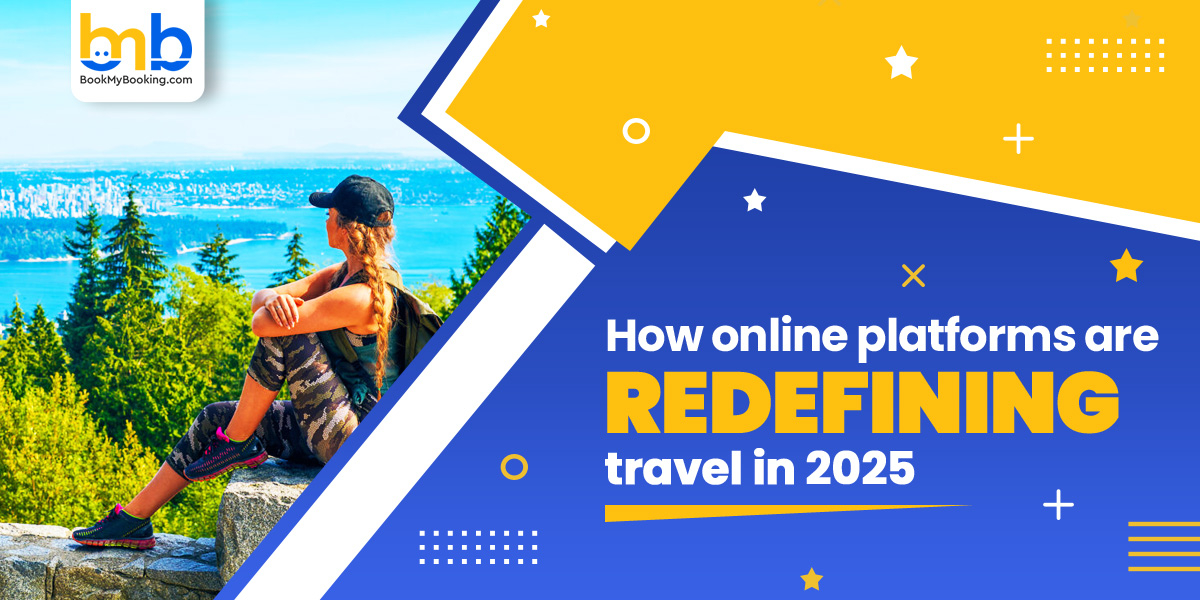In 2025, travel is undergoing a profound transformation. It is driven by rapid technological advancements, shifting traveller preferences, and the significant influence of online communities. The landscape of exploration was previously defined solely by destinations, but now it is also shaped by how people connect, plan, and experience their journeys. From the surge in solo travel in 2025 and the growing popularity of frolics, to the revolutionary capabilities of travel planning apps, and vibrant travel communities online, the way we travel has become more personalised, social, and dynamic than ever before.
This blog explores the key trends, platforms, and innovations that are redefining travel in 2025, highlighting how technology and community are shaping the future of exploration.
The Solo Travel Renaissance: Why Solo Travel in 2025 is Thriving?
Solo travel in 2025 has transitioned from a niche to a mainstream phenomenon. According to recent reports, solo trips now account for 18% of all global travel bookings, and the solo travel market is expected to surpass USD 1.07 trillion by 2030, growing at a CAGR of around 14% from 2025 onward. Travellers are increasingly seeking independence, personal growth, and the freedom to shape their itineraries, with Gen Z and millennial women leading the charge.
A recent study reveals that 58% of Gen Z women plan to take solo international trips in 2025, while 71% of all solo travellers are women. Additionally, older travellers, particularly women aged 50 and above, are increasingly prioritising self-guided experiences. About 61% of women over 50 prefer travelling solo for the peace, autonomy, and depth of experience it offers. This growth reflects a broader trend in modern tourism that many are calling the Solo Travel Evolution.
How BookMyBooking.com Empowers Solo Travellers
At the centre of this evolution is BookMyBooking.com, offering a full suite of tools specifically tailored for solo travel in 2025. The platform's custom filters help travellers find solo-friendly accommodations, safe neighbourhood guides, and curated activities that cater to individual interests and comfort levels. It also offers 24/7 travel support and integrates local insights. This makes it easy for solo explorers to make informed decisions without relying on group travel dynamics.
Read More - Indians Rely Most On Travel Influencers
Through its best platforms for solo travellers, BookMyBooking.com now offers features like:
- Group meetup alerts in major destinations for optional social interaction.
- One-click itinerary planners that adapt based on pace, budget, and personal interest.
Redefining Connection Through Frolleagues Group Travel
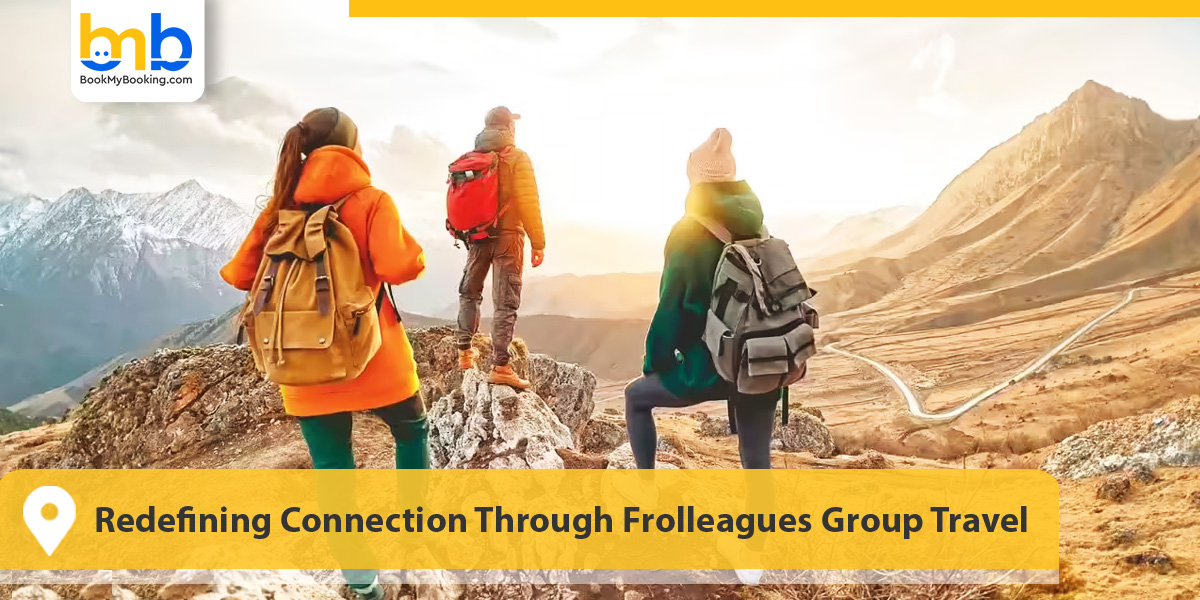
The shift toward hybrid and remote work has not only restructured workplaces—it has reshaped how people travel together. Frolicking group travel has emerged as one of the most notable travel trends of 2025, where co-workers who have become friends choose to travel socially outside the office. This trend is particularly prevalent among mid-level professionals aged 25–40, who are increasingly blending their workplace relationships with leisure time.
Current data shows that nearly 30% of travellers in 2025 plan to travel with work colleagues who have become companions. Fifty-five per cent of companies now support off-site team retreats to boost morale and productivity. Business travel is no longer strictly about meetings—it's become a platform for bonding, creativity, and social rejuvenation. This cultural shift is often referred to as Frolleagues & Collaborative Travel, merging the social energy of friend groups with the reliability of professional relationships.
How Travel App Serves the Frolleague Traveler
Recognising the growth of the travel trend among colleagues, the travel apps has introduced travel planning options specifically for co-travelling colleagues. These tools allow groups to plan joint itineraries, split expenses, coordinate hybrid work-friendly accommodations, and even vote on preferred destinations.
Key features include:
- Shared itineraries are editable by all members of the travel group.
- "Work+Leisure" hotel filters for properties with coworking spaces and team-friendly amenities.
- Discounted packages for small groups of 3 to 8, tailored explicitly for midweek travel to reduce costs.
- Meeting-space add-ons for teams combining off-site meetings with social travel.
This focus on frolleagues group travel has positioned these apps as a leading platform for both workplace offsites and friendly group getaways. It combines convenience and collaboration, allowing travellers to stay productive while creating meaningful experiences.
Smarter Travel with travel planning apps 2025
Travel in 2025 demands a planner, one that's intelligent, intuitive, and responsive. That's why travel planning apps in 2025 are more advanced than ever, combining AI-powered itinerary suggestions with real-time updates, social integrations, and budget tracking. Modern travellers expect more than just bookings—they expect a digital travel assistant that adapts to them.
Research indicates that over 70% of travellers in 2025 utilise at least one mobile app to plan their trips. And among Gen Z, the number rises to 88%, reflecting their comfort with tech-based decision-making. These travellers are highly motivated by personalisation, time efficiency, and responsive planning tools.
Read More - Myanmar Solo Travel Guide 2025
What makes 2025's travel planning apps different?
Artificial Intelligence and Personalization: Advancements in AI have enabled apps to analyse travellers' past preferences, and social media activity to generate customised itineraries. These AI trip planner tools can predict optimal flight times, recommend less crowded attractions, and dynamically update plans based on weather or local events.
Integrated Booking and Real-Time Adjustments: Modern apps consolidate flights, accommodations, ground transport, and experiences into a single interface. Travellers receive push notifications about delays, cancellations, or new deals, enabling them to adjust their plans seamlessly. The integration of real-time information ensures minimal disruptions during trips.
Social and Collaborative Features: Group travel has never been easier, thanks to shared itinerary platforms that allow multiple users to contribute, vote on destinations, and split expenses digitally. This feature supports the growing trend of group travel among friends and wider group explorations.
Sustainability and Wellness Insights: Travellers are increasingly eco-conscious. Many apps now include sustainability scores for hotels and activities alongside options for digital detox retreats or off-the-beaten-path excursions that reduce environmental impact.
Budget Management and Predictive Pricing: Price forecasting algorithms enable travellers to book flights, accommodations, and packages at optimal times, saving money without compromising convenience. Budget trackers are linked to spending patterns, which helps prevent surprises and keep trips financially manageable.
How Social Media Shapes the Way We Travel in 2025
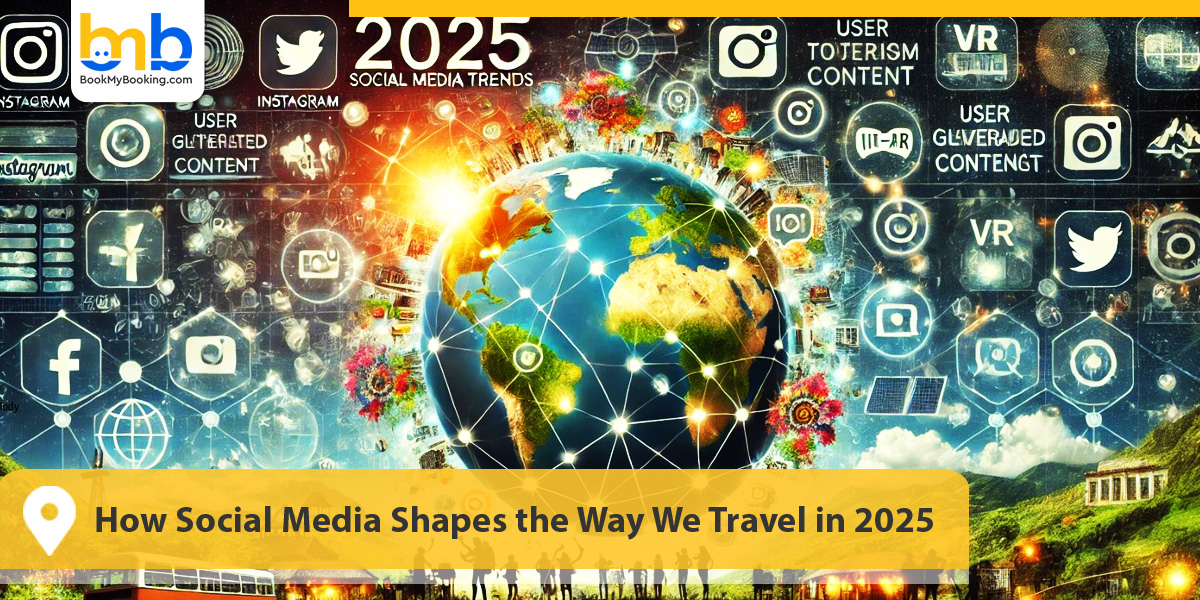
The influence of social media on travel has never been more substantial. In 2025, platforms like Instagram, TikTok, and emerging content hubs have become central to social media travel trends, transforming how travellers choose destinations, plan itineraries, and share experiences.
Recent data show that over 65% of travellers worldwide say their travel decisions are directly inspired by social media content. TikTok's travel-related videos, in particular, have experienced a surge in popularity, with #travel tags generating billions of views every month. Instagram remains a powerhouse, with its immersive visuals sparking what many refer to as Instagram travel inspiration.
The mechanics behind the influence
Real-time discovery: Unlike traditional guides, social media delivers up-to-the-minute recommendations, from hidden gems to trending local experiences.
Authenticity matters: Travellers trust peer reviews and genuine content from influencers and everyday users more than polished advertisements.
Short-form storytelling: Short-form storytelling, particularly in bite-sized videos and reels (especially on TikTok), highlights the unique aspects of destinations, creating an immediate desire to explore those places.
Rise of travel influencers and guides in 2025
Travel Influencers of 2025 have evolved from simple bloggers into micro-communities and trusted sources for niche travel types, such as sustainable tourism, adventure, and cultural immersion. Their influence can directly impact tourism flows; for example, several formerly obscure towns have experienced surges in visitors after being featured in viral TikTok videos, demonstrating the power of this trend.
Additionally, the rise of TikTok travel guides means travellers can access detailed trip advice and itineraries in a highly engaging, visual format. Many apps and platforms now integrate these guides directly, blurring the lines between social media inspiration and practical travel planning.
Budgeting and Gen Z habits
Social media also plays a significant role in budget travel hacks, where influencers share tips on affordable accommodations, flight deals, and off-season travel. This resonates especially with Gen Z, whose travel behaviours are shaped by digital natives who prioritise experiences and value.
According to recent studies, Gen Z travel habits emphasise social sharing and authentic experiences over luxury. They often turn to female-led travel communities online and solo travel groups, combining inspiration with actionable advice.
Rise of travel communities online
Travel communities online have become vital hubs where travellers exchange tips, find companions, and share experiences before, during, and after trips.
Recent surveys indicate that over 50% of travellers consult online travel communities for recommendations, with platforms ranging from dedicated forums to social media groups and niche apps. These communities bridge the gap between traditional travel agencies and purely transactional bookings.
Read More - Best Way To mindful vacations
The evolution of online travel communities
The growth of specialised social networks and apps has let travellers connect instantly with others who share their interests, values, and travel preferences. This fosters a sense of belonging and confidence, particularly among solo travellers and niche groups, such as female solo travellers, adventure seekers, and digital nomads.
Communities provide more than recommendations; they offer emotional support, real-time updates on local conditions, and opportunities to join group trips or meetups anywhere in the world.
Why travellers turn to online communities
- Trusted advice: Peer recommendations are seen as more credible than marketing content or reviews.
- Tailored support: Whether it's advice for female solo travellers, digital nomads, or eco-tourists, communities provide niche guidance.
- Social planning: Many travellers find travel buddies or form interest-based groups, which enhances safety and enjoyment.
Data shows…
- Over 60% of millennials and Gen Z rely on online travel communities before and during their trips.
- Group travel arranged through digital communities has increased by 35% in the last two years.
- Female-focused travel communities have experienced a 50% growth since 2023, underscoring a strong demand for safe and supportive environments.
The strength of travel communities online in 2025 is clear: they empower travellers to explore with confidence, connect meaningfully, and create richer, more fulfilling journeys.
Living and Working Anywhere: The Rise of the Digital Nomad Lifestyle 2025
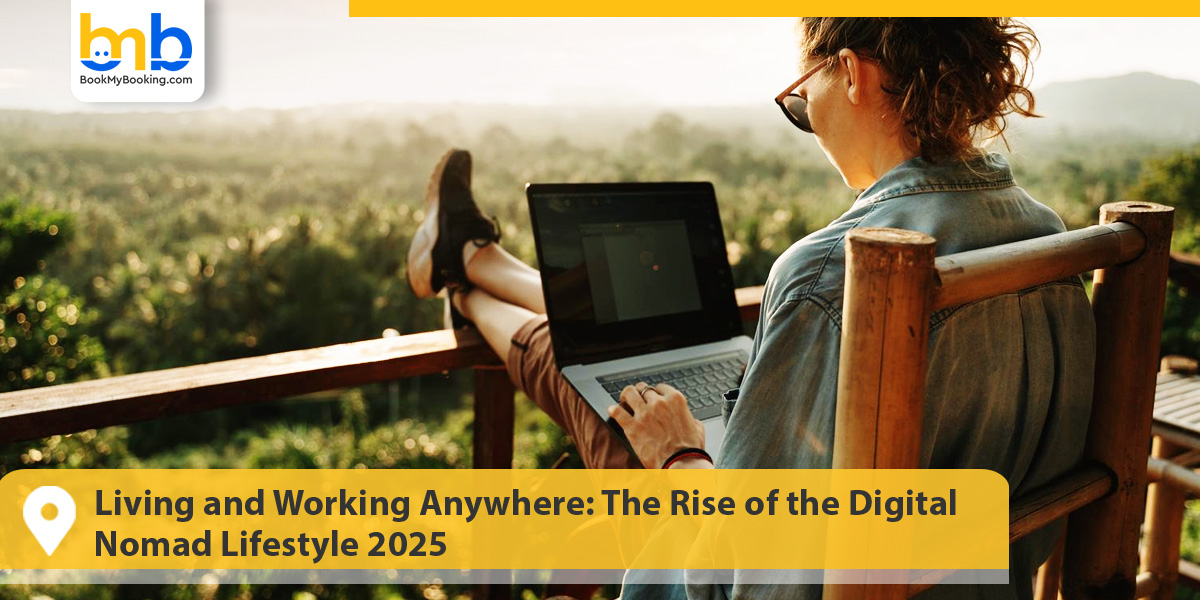
The concept of travel in 2025 has blended seamlessly with work, giving rise to the digital nomad lifestyle 2025, a way of living where professionals combine remote work with continuous travel. According to a 2024 report by MBO Partners, there are over 15 million digital nomads in the US alone, and this number is projected to grow by 30% globally in 2025. This growth is fueled by flexible work policies, improved connectivity, and evolving cultural attitudes toward work-life balance.
Growth of digital nomad communities
These nomads are no longer isolated wanderers; they form vibrant digital nomad communities that provide social support, networking opportunities, and co-living options. Popular nomad hubs, such as Bali, Lisbon, Medellín, and Chiang Mai, have seen the emergence of dedicated coworking spaces, community events, and local services tailored to long-term travellers.
Governments worldwide have introduced digital nomad visas to attract this demographic, reflecting the significant economic impact of this trend. Destinations are competing to offer seamless services—from fast internet and reliable healthcare to cultural experiences that foster engagement beyond work.
Platforms enabling the lifestyle
The success of this lifestyle depends heavily on digital platforms that facilitate:
- Finding reliable, nomad-friendly accommodations with good workspaces.
- Connecting with local and global nomad groups for collaboration and socialising.
- Managing taxes, visas, and healthcare remotely.
- Booking flexible travel options with easy rescheduling.
Technologies supporting these functions are rapidly evolving, integrating AI-powered planning, real-time community feedback, and secure payment solutions.
Challenges and trends
Despite its appeal, the digital nomad lifestyle 2025 comes with challenges such as maintaining productivity, managing loneliness, and navigating visa complexities. However, remote work and travel options continue to improve, with an increasing number of companies recognising the value of supporting nomadic employees.
Nomads increasingly seek balance through wellness retreats, digital detoxes, and locally immersive experiences, making the lifestyle sustainable and enriching.
Exploring the Night: The Rise of Noctourism Experiences
Travel in 2025 is not limited to daylight hours. The growing interest in Noctourism experiences reflects a shift toward exploring destinations after dark, combining culture, wellness, and entertainment in unique ways. This trend is defining how cities, resorts, and tour operators design and promote nighttime activities.
Why is Nocotourism gaining momentum?
Several factors contribute to the rise of Noctourism experiences:
- Cultural curiosity: Travelers seek authentic nighttime rituals, from local night markets and street food tours to traditional festivals that come alive after sunset.
- Wellness focus: Nighttime excursions can offer calmer, less crowded environments and opportunities for digital detox, stargazing, and moonlit nature walks.
- Climate considerations: In warmer regions, nighttime exploration offers comfortable temperatures and a different sensory experience.
- Economic boost: For destinations, promoting noctourism extends tourist hours and distributes visitor spending more evenly.
Cities such as Tokyo, Marrakech, Reykjavik, and Mexico City have embraced noctourism by developing after-dark tours, nocturnal wildlife safaris, and illuminated heritage walks. Many hospitality providers now include special nighttime programming to attract these travellers.
Booking and technology trends
Modern travellers use platforms that curate Noctourism experiences tailored to their preferences—whether it's a moonlight kayak trip or late-night cultural shows. Apps are increasingly featuring filters for night-based activities and recommending events aligned with visitor interests and safety considerations.
This trend also aligns with the broader 2025 travel trends movement toward personalised, experience-driven travel. It appeals to digital nomads, solo travellers, and groups alike who want to maximise their time and fully immerse themselves in local life.
The wellness connection
Noctourism often overlaps with wellness travel, as travellers seek digital detox retreats and mindful nighttime experiences that help reset their circadian rhythms and reduce travel fatigue. Nighttime yoga sessions, sound baths under the stars, and evening meditation workshops are becoming popular options.
Top Social Media Travel Trends 2025
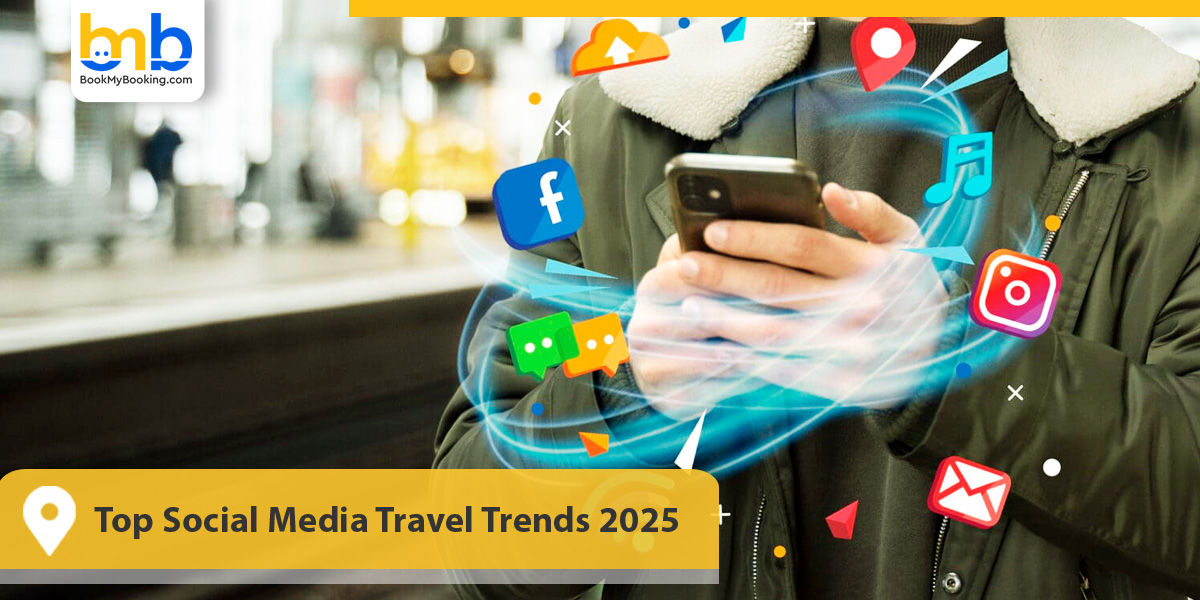
As we delve deeper into social media travel trends for 2025, it becomes evident that platforms are evolving beyond mere inspiration hubs; they're becoming full-fledged travel facilitators. Travellers increasingly use social media not only to discover new destinations but to book experiences, connect with locals, and share real-time stories.
Key trends shaping social media and travel
Short-form video dominance: TikTok-style clips continue to grow, with travel content creators generating viral destination highlights, quick travel hacks, and authentic reviews.
Augmented reality (AR) previews: Platforms are integrating AR to let users "try before they fly", from virtually walking through hotels to exploring museums digitally.
Community-driven micro-influencers: Smaller, niche travel influencers foster trust and engagement, shifting focus from mass appeal to authenticity.
Social commerce for travel: Booking directly via social media platforms is gaining traction, blending discovery and purchase seamlessly.
Sustainability spotlight: Eco-conscious travel content is trending, influencing choices toward responsible tourism.
What does this mean for travellers?
These trends enable quicker and more confident travel decisions, especially among Gen Z and millennials, who value authentic, bite-sized content and seamless booking processes. The power of social media travel planning lies in its immediacy and personalisation, creating a direct link between inspiration and action.
How does Social Media Influence Travel?
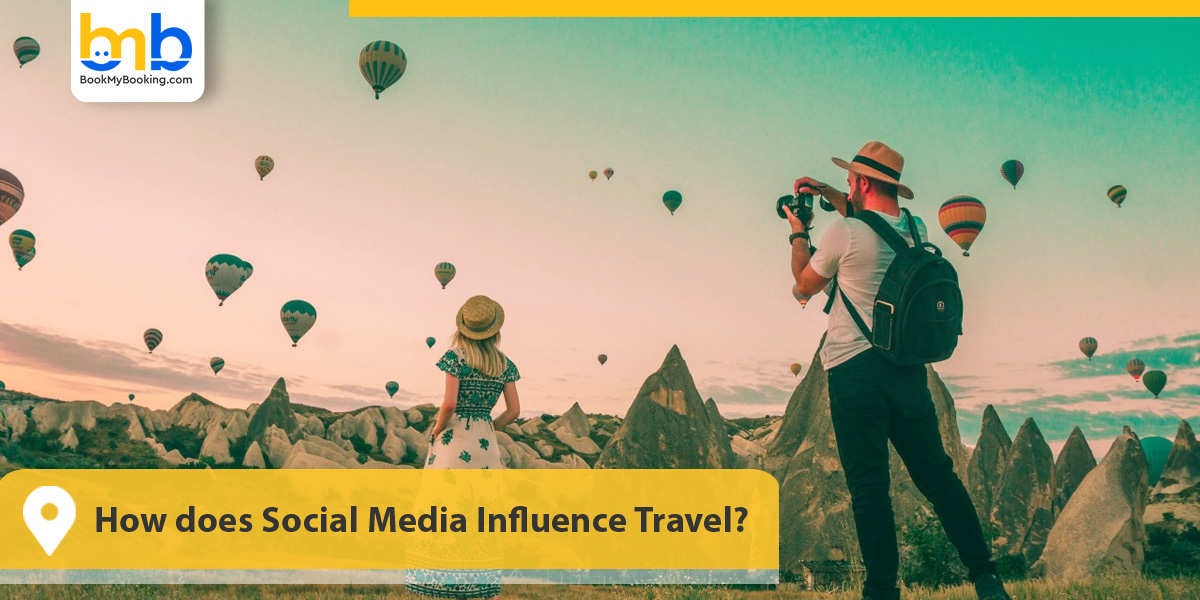
Instagram's role continues.
Instagram remains a visual powerhouse of social media channels. With over 2 billion monthly active users, it's the go-to platform for Instagram travel inspiration. Its Stories, Reels, and Guides features enable users to share authentic snapshots, detailed itineraries, and hidden gems. Influencers and everyday travellers alike utilise these tools to craft immersive travel narratives, sparking curiosity and a sense of wanderlust.
Branded content and interactive features, such as polls and Q&As, help travellers engage directly with creators and local experts. This makes Instagram a hybrid of social connection and travel planning.
Facebook's evolving community focus
Facebook's strength lies in its vast network of travel communities and groups. With over 1.9 billion daily users, its niche groups—such as female solo travel groups, digital nomad communities, and regional travel forums- offer trusted spaces for advice, safety tips, and shared experiences.
These groups also facilitate travel coordination and the integration of travel buddy apps, helping users find companions and organise group travel efficiently.
TikTok and short-form video impact
TikTok's explosive growth fuels rapid discovery through bite-sized, engaging content. The platform's algorithm promotes authentic experiences and provides real-time recommendations to inform spontaneous travel decisions.
Cross-platform synergy and booking
Increasingly, these platforms integrate social commerce features, allowing users to book accommodations, tours, and experiences directly within the apps, thereby blurring the lines between discovery and purchase. This seamless integration enhances the role of social media travel planning.
Conclusion: Embracing the Future of Travel in 2025
The travel landscape in 2025 is marked by unprecedented personalisation, connectivity, and innovation. Today's travellers enjoy a level of freedom and support that has never been seen before.
Social platforms like Instagram, Facebook, and TikTok continue to revolutionise how people discover and plan their journeys, while digital nomad communities and the expanding digital nomad lifestyle redefine what it means to live and work anywhere in the world. Meanwhile, novel experiences, such as Nocotourism and vibrant online travel communities, invite exploration beyond traditional boundaries.
Together, these forces are shaping travel into a deeply immersive, socially connected, and flexible experience, one that adapts to the unique desires and lifestyles of modern explorers.
The future of travel is how you connect, plan, and experience the world on your terms.

